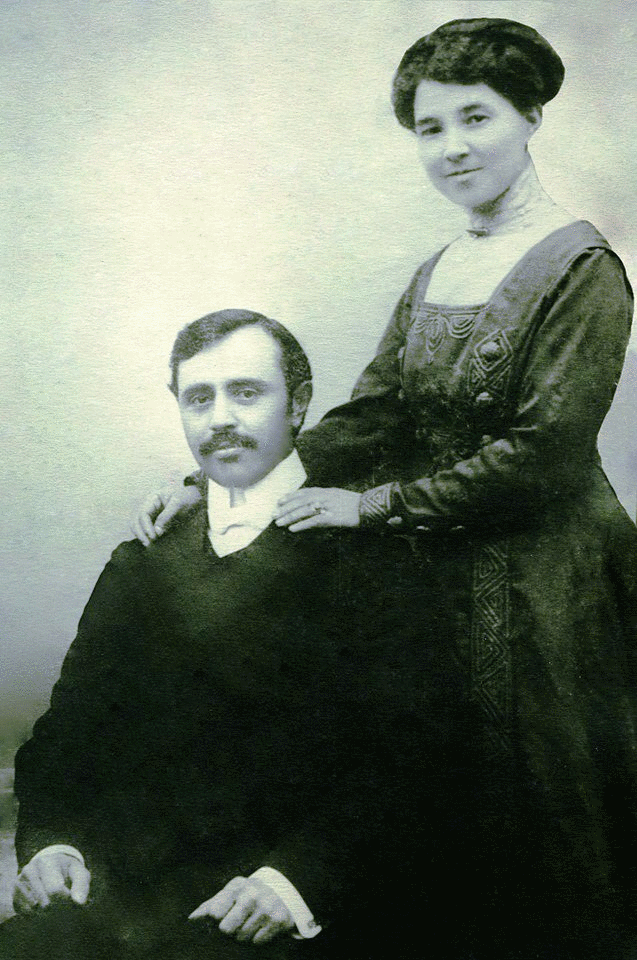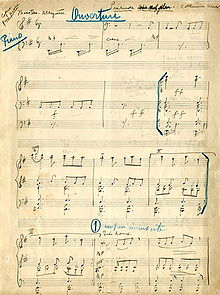Uzeyir Hajibeyov
Uzeyir Hajibeyov
Üzeyir bəy Hacıbəyov | |
|---|---|

Hajibeyov in 1945
| |
| Background information | |
| Also known as | Uzeyir Hajibeyli |
| Born | September 18, 1885 Agjabadi, Russian Empire |
| Origin | |
| Died | November 23, 1948 (aged 63) Baku, Azerbaijani SSR, USSR |
| Genres | [[Classical music |Classical]] |
| Occupation(s) | Composer, conductor, publicist, playwright, teacher, translator |
| Years active | 1908–1944 |
| Website | www.hajibeyov.com |
Contents
Early life
Shusha, often dubbed as the cradle of Azerbaijani music and culture, had a reputation for its musical heritage. The town was also referred to as "the Music Conservatory of the Caucasus" because of its many talented musicians and singers. And the fact that Hajibeyov grew up in Shusha explains how at 22, in 1908, with very little formal musical education, he was capable of writing a full-length opera.
Huseyngulu Sarabski as the first Majnun in the opera Leyli and Majnun (Baku, 1908).
Hajibeyov was no stranger to the tragic chaos of war; he lived through the Revolutions of 1905 and 1917, the fall of the Democratic Republic of Azerbaijan in 1920, and both World Wars. The political repercussions of these military conquests often manifested in other forms of chaos. For example, between 1920 and 1940, the alphabet systems for writing Azeri were changed three times — from Arabic to Latin, and from Latin to Cyrillic[7] — a process which greatly hindered and interrupted the educational and cultural process and may well have been one of the factors influencing Uzeyir Hajibeyov to present his ideas verbally on the musical stage.
Merging traditional and Western styles
Uzeyir Hajibeyov with his wife
Musical contributions
Uzeyir Hajibeyov's manuscript of Arshin Mal Alan, written in 1913.
Hajibeyov's second opera Sheikh Sanan was written in 1909 in a form that was entirely opposite to the first. This time Hajibeyov employed a purely European style. Sheikh Sanan received raves as a musical composition, but the content was too progressive for the period. In this opera, Hajibeyov advocated that marriage should not be bound by nationality or religion - in essence, it was another form of integration. But this time, it backfired. The story line follows a religious sheikh on his way to Mecca who meets a very beautiful Georgian lady. To his horror, the lovely creature's father turns out to be a swineherd, caring for what, to him, was a forbidden animal. In the end, the sheikh denounces his religion to win the woman. It is said that when the opera was performed, many people were offended and walked out, leaving Hajibeyov with the realization that he had outpaced his generation too much this time. As a result, he made a drastic decision and burned the score. When asked by Ramazan Khalilov, his assistant, how he could do that, Hajibeyov replied: "I didn't destroy my opera. It's my own creation so it's always in my head." Khalilov said that Hajibeyov went on to use this same magnificent music 27 years later to create Koroğlu, an opera that many acclaim to be his finest.[9][10]
In contrast to Sheikh Sanan, Hajibeyov's operas Rustam and Sohrab (1910), Asli and Karam (1912), Shah Abbas and Khurshid Banu (1912), and Harun and Leyli (1915) were entirely based on Azeri folk music elements, primarily mugham.
In October 2006, the musical comedy Arshin Mal Alan ("The Cloth Peddler") by Uzeyir Hajibeyov, written in 1913, was announced to be performed on western stages for the first time.
A poster of "Arshin Mal Alan" at Femina theatre of Paris in 1925.
In 1931, Hajibeyov helped in establishing the Azeri Folk Instruments Orchestra affiliated with the Radio Committee. This orchestra performed European classical pieces, such as those by Mikhail Glinka, Wolfgang Amadeus Mozart, Franz Schubert, Georges Bizet and others. Hajibeyov thus was the first musician to adapt the note system to traditional Azeri musical instruments.
In 1936, Hajibeyov assisted in founding of the Azerbaijani State Choir within the Azerbaijan Philharmonic Society. One of the most serious problems he faced was the mono-voiced repertoire of Azeri folk songs, which allowed harmonization distort style of the song and, on occasion, even alter the melody line when it changed modes. Hajibeyov resolved this problem by using contrapuntal polyphony and unison-doubling rather than four-part singing in the problematic sections.
Hajibeyov devoted much energy to the idea of integrating woman's role and status into the male-dominated world. The concept of women's emancipation runs through many of his works often in the form of comedy or satirization as in the case when he makes fun of the process of selecting marriage partners, a process hindered by the fact that women were still wearing veils until the 1920s when the Soviet regime prohibited them.
Publications
From 1919 to 1920 Hajibeyov served as editor-in-chief for the newspaper Azerbaijan, the main governmental media body of the Democratic Republic of Azerbaijan.In 1927, Hajibeyov published Collection of Azerbaijani Folk Songs along with composer Muslim Magomayev. For the first time, more than 300 pieces of Azeri folk music were documented by notation. In 1945, he published the book entitled The Basis of Folk Music in Azerbaijan, which has been translated into several languages including English.
Operas
“Leyli and Majnun”
The opera art was established art not only in Azerbaijan, but also in the entire Muslim East by means of Hacibeyov's opera "Leyli and Majnun"– which premiered on January 12, 1908, at the theatre of Haji Zeynalabdin Taghiyev. Hajibeyov wrote this libretto of the opera based on poem of the same name written by Fizuli.The first performance was made by actor and director Hussein Arablinski.The band-master was the writer-dramatist Abdurrahim bay Hagverdiyev. Huseynqulu Sarabski was in the role of “Majnun” and Abdurrahim Farajov in the role of “Leyli”.In next performances, Hajibeyov himself and his close friend and colleague, composer Muslim Magomayev performed as band-master.[11]This role was acted for the first time by Huseyinqulu Sarablinski. Then, these people - Sidghi Ruhulla, Khanlar Hakhverdiev, Aliovsat Sadıghov, Shirzad Hüseynov, Gulagha Mammadov, Mais Salmanov, Gulu Asgarov, Bakir Hashimov, Ali Mehdiyev, Arif Babaev, Baba Mirzaev, Canali Akbarov, Safa Gahramanov, Alim Gasımov and Mansum İbrahimov performed in a role of Majnun at the next performance.
“Koroglu”
“Koroglu opera” premiered firstly on April 30, 1937 at the Azerbaijan Opera and Ballet Theatre. This is the first classical opera that based on the motives of heroic epic in Azerbaijan.In this opera, Hajibeyov created arias, mass choral scenes, various ensembles, ballet numbers and recitatives.
In the next years of his life, he worked on "Firuza" opera.
Musical comedies
“Husband and wife”
The first musical comedy of Hajibeyov is “Husband and wife” which is consist of three scenes. This is the first example of Azerbaijani musical comedy. The first premiere of it was in 1910. H.Sarabski and A.Aghdamski performed in the roles of Marjan and Minnat. Hajibeyov wrote the sketch of the comedy himself.“O olmasın, bu olsun”
After “Husband and wife” opera, he began to write the second operetta of him. The first premiere of it was at the theatre of Mailovs brothers in Baku in 1911. “Mən nə qədər qoca olsam da” song and “Uzundere” national folk music are sounded in this opera with some changes on it.Laters, this opera was translated into various languages, performed in Caucasian countries, Turkey, Bolgaristan, Yaman and other countries.
"Arshin Mal Alan"
The first feature film based on “Arshin Mal Alan” Musical comedy was shot in 1916. This film was the silent film.For the next time it was screened at "Baku movie studio" in 1945 with some changes on it. The main role of film belonged to Rashid Behbudov.
This comedy again was screened in Baku, in 1965. Director of the film was Tofiq Taghizade and Fikrat Amirov performed as a music redactor. It was translated into many languages such as English, German, Chinese, Arabic, Persian,Poles languages and etc.
Official honours
Commemorative stelae in Donaupark, Vienna.
Hajibeyov was a professor at the Baku Academy of Music (of which he was also head in 1928–1929 and 1939–1948) and Active Member of the Academy of Sciences of Azerbaijan. For the last 10 years of his life, he was Chairman of the Union of Azerbaijani Composers.
Hajibeyov joined the Communist Party in 1938.[13] He served twice as a deputy of the Supreme Soviet of the Soviet Union, the highest legislative institution in the Union.
Hajibeyov died of diabetes at the age of 63, and was buried at the Alley of Honor in Baku.
On September 18, 1995 the 110th anniversary of Hajibeyov's birth has been celebrated. No one in the history of modern music in Azerbaijan is recognized for having done more to lay the foundation for Azerbaijani music as it exists today, especially with its unique synthesis of Eastern and Western traditional musical instruments and musical forms.
In 2008 the National Bank of Azerbaijan minted a 100 manat gold commemorative coin dedicated to Hajibeyov's memory.[14]
In June 2011 President of Azerbaijan Ilham Aliyev and President of Serbia Tadic unveiled a monument of Hajibeyov on the Dunavski kej in Novi Sad, Serbia.[15]
On the occasion of the 130th birthday anniversary of the composer, Los Angeles Mayor Eric Garcetti proclaimed September 18, 2015 as the "Uzeyir Hajibeyli Memorial Day" in the City of Los Angeles and called on all residents to join this celebration.[16] Also U.S. Congressman Paul Gosar from Arizona extended a Congressional Record recognizing Hajibeyov's achievements.[17]
Uzeyir Music Day
September 18 is celebrated as "Uzeyir Music Day" after national leader Heydar Aliyev's decree in 1995. Different events and celebrations are usually held on this day with participation of world-famous musicians.Stage works
- Leyli and Majnun, opera, 1908.
- Sheikh Sanan, opera, 1909. Destroyed by the composer.
- Husband and Wife, operetta, 1910.
- O olmasın, bu olsun ("If Not That One, Then This One"). Musical comedy (operetta) in four acts, 1910
- Rustam and Zohrab, mugham opera, 1910.
- Asli and Kerem, mugham opera in four acts and six scenes, 1912.
- Shah Abbas and Khurshid Banu, mugham opera, 1912.
- Arshin Mal Alan ("The Cloth Peddler"). Musical comedy (operetta), 1913.
- Harun and Leyli, mugham opera, 1915
- Koroğlu ("The Blind Man's Son"), opera. Written 1936, premiered 1937.
In popular culture
In 2013, Google celebrated Hajibeyov's 128th Birthday with Google Doodle on its Azerbaijani version.[18][19]Gallery
See also
References
Leyli and Majnun was not only the first opera by an Azeri composer, but also the Islamic world's first opera
- "Google создал "дудл" в честь Узеира Гаджибекова". www.anspress.com (in Russian). Archived from the original on 6 November 2014. Retrieved 6 November 2014.
External links
| Wikimedia Commons has media related to Uzeyir Hajibeyov. |
- Web-site dedicated to Uzeyir Hajibeyov - HAJIBEYOV.com including librettos, articles by and about Hajibeyov and some audio recordings of his works
- Librettos in English and Azeri Latin of most of Hajibeyov's operas and musical comedies. HAJIBEYOV.com [1].
- Monument of Uzeyir Hajibeyov to be erected
- "Soviet Music and Society Under Lenin and Stalin: The Baton and the Sickle" by Matt O'Brien in Azerbaijan International, Vol. 13:1 (Spring 2005), pp. 80–81.
- "Politically Correct Music: Stalin's Era and the Struggle of Azerbaijani Composers" by Aida Huseinova, in Azerbaijan International, Vol. 14:2 (Summer 2006), pp. 56–65.
- A short section of a stage production of the opera Köroğlu, YouTube: [2] (10 min 55 sec).
The libretto of this part of opera is in Persian. - A short section of Hajibeyov's celebrated social satire Mashadi Ibad: [3] (9 min 40 sec).
- Political and socio analysis of Mashadi Ibad by Abulfazl Bahadori, in [4], Vol. 6:4 (Winter 1998), pp. 22–23.












No hay comentarios:
Publicar un comentario